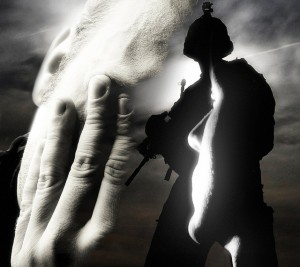 Grief is experienced by all, but is a particular emotion that is commonly exemplified within individuals who are part of the military lifestyle. Webster dictionary defines grief as an emotional suffering caused by bereavement, affliction, remorse, panic, or despair . One’s association with the military will influence the type of grief experienced in a given circumstance. However, no matter if you are the veteran who lost a fellow comrade, the child whose parent died in war, a spouse, parents, sibling or the community that lost a citizen during combat, we all experience grief throughout life, but how we chose to adapt and utilize our resources will determine our capability to survive guilt.
Grief is experienced by all, but is a particular emotion that is commonly exemplified within individuals who are part of the military lifestyle. Webster dictionary defines grief as an emotional suffering caused by bereavement, affliction, remorse, panic, or despair . One’s association with the military will influence the type of grief experienced in a given circumstance. However, no matter if you are the veteran who lost a fellow comrade, the child whose parent died in war, a spouse, parents, sibling or the community that lost a citizen during combat, we all experience grief throughout life, but how we chose to adapt and utilize our resources will determine our capability to survive guilt.
According to Calhoun, veterans often experience survivor guilt which is a form of grief that occurs following life-threatening situations that includes the death of fellow unit member. The families and communities of these veterans often experience grief as well. However, the type of grief that occurs within a family is a result of the family’s inability to understand the soldier’s emotions, or because the soldier has actually died in combat.
While veterans and their families are grieving through different means, the communities surrounding them may fail to acknowledge the delicate grieving process. In the case that a soldier dies in combat, there is a possibility members within a community might not contain the knowledge of how to respond, and therefore, do not give any recognition to a grieving family.
Negative responses
When a veteran endures grief in the form of survivor guilt there are symptoms such as; anger, shock, dazed, unfulfilled, depression, anxiety, and high levels of stress. Veterans who do not deal with their feelings of survivor guilt adequately often times manifest their emotions resulting into Post-traumatic Stress Disorder. Okulate and Jones researched the strong relationship between survivor guilt and Post-traumatic Stress Disorder (PTSD). Feeling alone, a soldier with PTSD may respond by withdrawing from society and turn to substance abuse to ease the pain. Alcohol and marijuana are chosen most commonly by veterans as outlets for their inability to speak to other about their inner feelings.
Families carry the burden of watching their loved one suffer. The family may feel hopeless because they cannot lift the weight of grief off their loved one’s shoulders. Carlson and Ruzek found that the family may also feel other emotions such as anger towards the veteran because the veteran withdrawals from their family who simply want to help the veteran more than anyone else. Ultimately, it is almost inevitable for the family to feel just as much grief as the soldier which can lead to their seeking relief through negative outlets as well, such as children acting out in class or disobeying parents. Taylor’s research has shown that children who lost a father during World War II were negatively affected even later as adults. Some negative reactions include, fear of abandonment, being alone, being left behind, trusting and letting go, getting lost, death, the dark, and a large fear of being replaced.
Positive Responses by the Veteran and Family
Although grief can be overwhelming, there are numerous resources for which a veteran and the family can utilize to cope and overcome the negative repercussions of grief. However, according to the National Center of PTSD, the most effective method for coping with grief involves actions which both the family and veteran work together and encourage each other through therapy. Remembering to make use of the resources available while maintaining a positive outlook not only uplifts the veteran’s attitude towards recovery, but also the family’s ability to see an end to the pain. Therapy provides the tools necessary to cope with the grief inside and reach out to their family and together, the veteran and family can work towards overcoming the obstacles.
Military Resources
In the case that a family is grieving over the death of a loved one in combat, another available resource is through the military. Chapin has found that the military make sure that before any soldier is deployed, the soldier has set up a will through the military’s lawyer. Additionally the military has low-cost life insurance in place for military members of up to $400,000 for as little as $20 a month. After the death of a soldier, the military pays the family a $100,000 tax-free “Death Gratuity.” Lastly, the military allows families to stay on base for up to 365 days, as well as retain the eligibility for “Military One Source Counseling” after the death of any given soldier.
Additional resources that a military family receives include casualty assistance and casualty assistance officers. According to Military Homefront, casualty assistance provides prompt and compassionate assistance to the deceased soldier’s family. Not only do the casualty assistance officers provide a prompt towards families who lost a member to war, but also help the family to go through the grieving process and to provide services such as funeral services, administrative paperwork, entitlements, and benefits associated with the deceased soldier. Below is video offering more information on how to cope with grief.
[youtube]http://www.youtube.com/watch?v=CjdgkoTa5OU[/youtube]
TAPS stands for Tragedy Assistance Program for Survivors, which is a resource for grieving military families.
Resources
Calhoun, R. D. (2008). Survivor Guilt: What
Long-term Survivors Don’t Talk About. The
Brain Tumor Society.http://virginiatech.healthandperformancesolutions.net/Anniversary.
Carlson, E. B., Ruzek, J. (2007). PSTD and
the Family. National Center for PSTD:
United States Department of Veteran
Affairs. http://www.ptsd.va.gov/professional/pages/ptsd-and-the- family.asp.
(2012)
Casualty Assistance. Retrieved from
Military Homefront website: http://www.militaryhomefront.dod.mil/MOS
Chapin, M. (2011). Family
Resilience and the Fortunes of War. Social Work In Health Care, 50(7),
527-542. doi:10.1080/00981389.2011.588130 http://www.tandfonline.com/doi/pdf/10.1080/00981389.2011.588130
National Center for PTSD (NCPTSD). (2006).
Returning from the War Zone. A Guide for
Military Families. (p. 1-11).
Washington D.C., U.S. Department of
Veteran Affairs. http://www.sanfrancisco.va.gov/SANFRANCISCO/oefoif/GuideforFamilies.pdf
Okulate, G.T., & Jones, O.B.E. (2006).
Post-traumatic stress disorder, survivor guilt and substance use- a study of
hospitalized Nigerian army veterans. South African Medical Journal,
12(1). (p33-40). Retrieved from http://www.sajp.org.za/index.php/sajp/article/viewfile/53/45
Taylor, S. (2010). The Childhood Experience of Being a War
Orphan: A Study of the Effects of Father Loss on Women Whose Fathers Were
Killed in World War II. Journal Of Loss & Trauma, 15(3),
228-241. http://www.tandfonline.com/doi/abs/10.1080/15325020903381709#preview
Webster’s Third N(2012) Casualty Assistance. http://www.merriam-webster.com/dictionary/grief
image by flicker user Truthout.org /cc-licensed
image by Aurora Farms.org/cc-licensed

